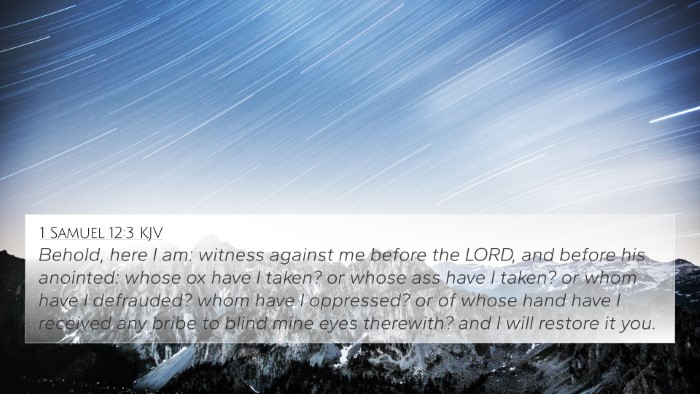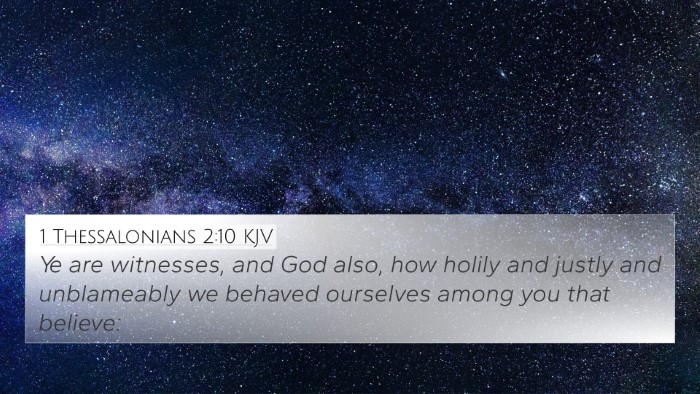Understanding Genesis 31:37
Genesis 31:37: "Whereas thou hast searched all my stuff, what hast thou found of all thy household stuff? Set it here before my brethren and thy brethren, that they may judge between us both."
Verse Summary
This verse occurs during a confrontation between Jacob and Laban, where Jacob defends himself against accusations made by Laban regarding stolen goods. Jacob challenges Laban to present any evidence of wrongdoing, emphasizing both transparency and justice.
Insights from Public Domain Commentaries
Matthew Henry
Henry emphasizes Jacob's integrity and his stand against Laban's unfounded accusations. He interprets Jacob's question as a firm assertion of his honesty, pointing out how he seeks a fair examination of the evidence. Jacob's assertiveness illustrates a significant transition from Laban's manipulation to Jacob's moral stance.
Albert Barnes
Barnes analyzes the context of family disputes, indicating that Jacob's challenge was meant to clear his name amongst not only Laban but also their assembled kin. He highlights the importance of mutual accountability in relationships, especially within families, showcasing that even patriarchs called for equitable settlements.
Adam Clarke
Clarke provides a deeper cultural context, reflecting on the customs of the time regarding possessions and disputes. He elaborates on Jacob’s demand for Laban to produce evidence of his claims. Clarke draws a parallel to the biblical principle that demands justice and honesty among individuals.
Thematic Connections in the Bible
Genesis 31:37 presents a strong theme of justice and accountability which resonates throughout the Scriptures.
- Proverbs 21:3: "To do justice and judgment is more acceptable to the Lord than sacrifice."
- Deuteronomy 32:4: "He is the Rock, his work is perfect; for all his ways are judgment: a God of truth and without iniquity, just and right is he."
- Psalm 89:14: "Justice and judgment are the habitation of thy throne: mercy and truth shall go before thy face."
- Micah 6:8: "He hath shewed thee, O man, what is good; and what doth the Lord require of thee, but to do justly, and to love mercy, and to walk humbly with thy God?"
- Matthew 7:2: "For with what judgment ye judge, ye shall be judged: and with what measure ye mete, it shall be measured to you again."
- Luke 16:10: "He that is faithful in that which is least is faithful also in much: and he that is unjust in the least is unjust also in much."
- Romans 12:19: "Dearly beloved, avenge not yourselves, but rather give place unto wrath: for it is written, Vengeance is mine; I will repay, saith the Lord."
Connections between Bible Verses
Genesis 31:37 invites readers to explore thematic Bible verse connections, enhancing understanding through cross-referencing biblical texts. Here, we see the necessity of honesty, testimony, and dispute resolution against a backdrop of personal integrity. Notably, connecting this to other verses also sheds light on similar principles:
- Exodus 20:16: “Thou shalt not bear false witness against thy neighbour.”
- 1 Timothy 5:19: “Against an elder receive not an accusation, but before two or three witnesses.”
- Ephesians 4:25: “Wherefore putting away lying, speak every man truth with his neighbour: for we are members one of another.”
Practical Application
Understanding Genesis 31:37 not just in isolation but as part of the broader scriptural narrative prompts believers to reflect on their own lives. It encourages integrity in personal dealings and reinforces the need for honest communication in all relationships.
Tools for Bible Cross-Referencing
Utilizing tools for Bible cross-referencing can enrich personal study and awareness of scripture. Some helpful resources include:
- Bible Concordance: A comprehensive index that helps locate specific verses.
- Bible Cross-reference Guide: A resource that connects verses thematically.
- Bible Reference Resources: Influential texts that compile related scripture insights.
Learning Through Inter-Biblical Dialogue
The practice of cross-referencing Bible verses enables a deeper understanding of overarching biblical themes and their applications in life. Discerning connections between the Old and New Testaments enriches this dialogue and opens pathways for more profound theological exploration.
Conclusion
The inquiry posed in Genesis 31:37 serves not merely as a historical account but as a pertinent reminder of the essential biblical values of accountability, honesty, and community integrity. By investigating related scripture and themes, believers can engage in a more robust and meaningful understanding of their faith and interactions with others.











